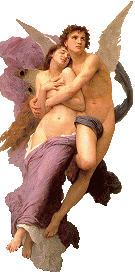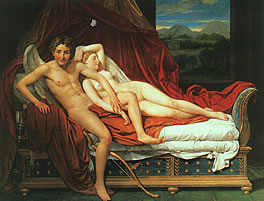
Does
Psyche Deserve Goddess Status?
By Kim Widhalm
With wedding bells ringing and ambrosia flowing, celebration is evident once again from high on Olympus as Eros celebrates his wife Psycheís new divine status. Even from below, mortals are aware of the joyous event.
Some mortals, however, arenít celebrating.
Some may argue, why does this maiden, lovely though she may be, deserve divinity? She isnít the first to be seduced by a god, nor will she be the last if Zeus keeps up his activities.
As many know, Psyche wasnít seduced- rather, by a careless mishandling of arrows, Eros fell for her before she fell for him. From there on, Psycheís critics have ample reason to slam her new status; she betrayed him, and good.
So why will we be worshipping her? Why is she lucky enough to be the eternal companion of the god of love?
To put it simply, because he married her. According to critic Josiah Osgood, "[Zeus]ís announcement that the couple has a marriage Ďin accord with civil lawí is especially important". While Osgood goes on to argue that Eros did attempt to divorce his wife for her lack of faith, it was not completed in a legal sense, hence bringing back Zeusís need to verify the validity of the marriage contract. As well, Osgood points out that because the supposed divorce took place as one left in anger, the divorce was not truly valid.
Therein, according with tradition, the wife is taken into the husbandís house. Nor mortal can live on Olympus with the gods, so out of preservation, as well as respect for the laws of marriage, Psyche needed to become a goddess to be a good wife. It is possible, as evident from their first home, that Psyche could have remained in their home in the valley. However, when Eros attempted to negate the marriage, the property became a harsh reminder of her one betrayal.
Before you start writing up marriage contracts to keep on hand should Zeus or Apollo visit your beds, ladies, we must look at the other reason surrounding Psycheís ascent up the mountain: she earned it.
Not unlike her divine relation Heracles, Psyche underwent trials of her own to be able to stand next to her husband.
With the all bad press, many tend to forget the Heracles did make it to Olympus as well. His most famous act isnít his first taste of nectar though- Heracles is famous in divine and mortals circles for his twelve labors. Only after completing these labors and allowing his mortal part to be burned away was he able to attain his birthright.
From the moment she first had to deal with her mother in law, Psyche was more than willing to prove her devotion. Sitting in a room with hundreds of different seeds to sort is a possible task- for someone with knowledge of grains and several weeks in which to accomplish the task, not to mention the amazing patience one would need to not go mad. Before her marriage, Psyche was a princess. She did not know grains. Even if she had, Aphrodite granted her one day. Impossible as the perimeters of her task seemed, she agreed. Then Psyche was willing to risk pain and death to please Aphrodite- by gathering wool from the legendary golden sheep. She only survived by taking the advice of some well meaning reeds. Again risking life and child, Psyche did not hesitate to set out climbing a steep cliff and facing giant serpents to retrieve water from the Styx and Cocytus. Finally, child in womb, Psyche descended into the Underworld and asked the Queen for some of her beauty to give to Aphrodite; a cure for the hours and days Aphrodite claimed to have spent caring for her wounded son.
Penniless and pregnant, Psyche risked madness and death to prove herself worthy of being Erosís bride.
Other semi divine beings, as well as Heracles, have been pulled up to the heavens to live with their divine progenitors. Psyche, though from a royal family, had no trace of divine blood in her prior to Zeusís decree. This separates Psyche from the other former mortals. More so than Heracles then, her trials set her apart as a mortal worthy of divine status. Heracles may have had more difficult tasks, but he had the blood of Zeus in his veins. Similarly, Castor and Pollux, Apollo and Artemis, Dionysus- all children of gods, they were divine before being granted admission to Olympus. Never before has a mortal been set upon to achieve what most gods are born with. That Psyche succeeded, albeit with the aid of nature, shows an innate destiny to become divine.
Furthermore, Psyche is aided by deities of Nature, Gaiaís assistants. In her first task, Psyche was set upon to sort grains in a short amount of time; ants, hardworking creatures of Gaia, assist Psyche in her task. In avoiding death by sheep, Psyche is warned by whispers in the reeds; whispers some could argue that came from the earth mother herself. Even Heracles would have had difficulty retrieving the water of the Underworld, but an eagle appears to save the day. The eagle, as you readers well know, is a symbol of the King of Gods- perhaps he saw reason to help his future relation. Finally, the voice of the Earth spoke to Psyche in her final task of retrieving the Queenís beauty; else wise, she would have flung herself from the tower that spoke to her, defeating the purpose of completing the tasks. The aid of natural forces is a clear sign that Earth was prompting Psyche towards divinity.

Without question, despite her initial lapse of judgment, Psyche proved herself over and over again worthy of goddess status through her trials. Through her marriage to Eros, she bound herself to a family of immortal relatives and carried within herself a semi divine child. By tradition and her own merit, Psyche is in fact deserving of her new status at Erosís side.
All we want to know now is this: Does she in fact deserve Eros? But then again, does anyone?
Apuleius, Translated by William Adlington. "Cupid and Psyche." Hare, John Bruno. Sacred Texts. 27 Jan 07. <http://www.sacred-texts.com/cla/cap/index.htm>.
Bulloch, Anthony. "Psyche." Anthony Bulluch. University of California, Berkley. Greek Myth.org. 27 Jan 07. <http://www.greekmyth.org/Psyche.html>.
Osgood, Josiah. "Nuptiae Iure Civili Congruae." American Pholilogical Association 136:2. Project Muse. 24 Jan 07. <http://muse.uq.edu.au.vortex2.ucok.edu:2050/journals/transactions_of_the_american_philological_association/v136/136.2osgood.html>.
Shwab, Gustav. _Gods and Heroes and Ancient Greece_. Olga Marx, Ernst Morwitz. New York: Pantheon Books, 1974.
"Eros and Psyche." Wikipedia. 24 Jan 07. <http://en.wikipedia.org/wiki/Cupid_and_Psyche>.